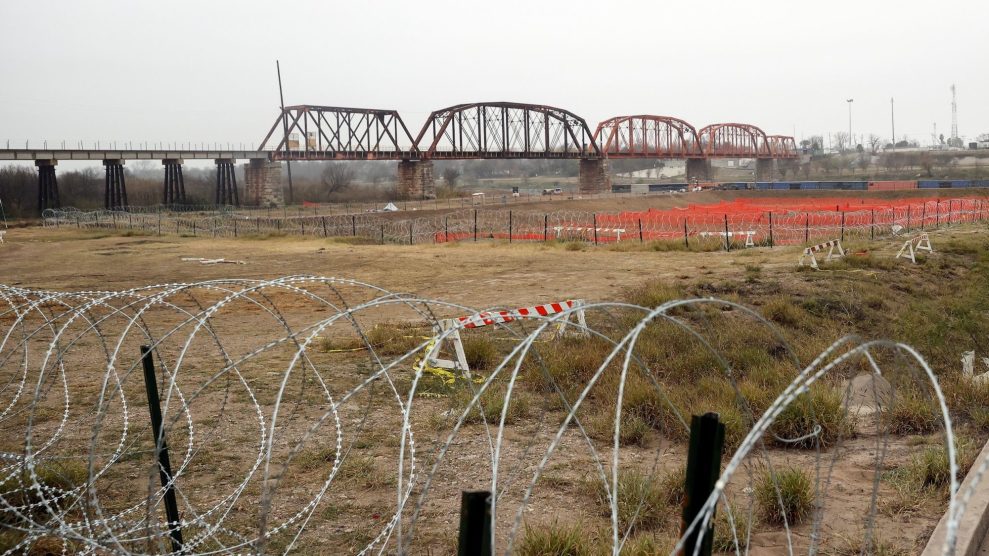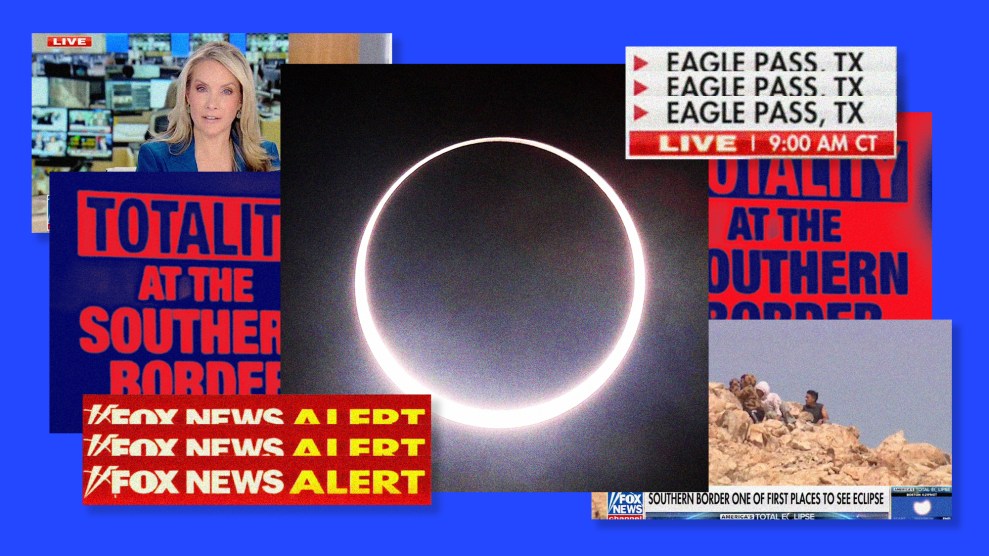
The Texas National Guard erected wire in front of entrances to the Shelby Park in Eagle Pass, Texas, and blocked Border Patrol from accessing the area after migrants drowned there Friday, the Department of Justice said in a new court filing.Adam Davis/EFE via ZUMA
Three migrants drowned in the Rio Grande near the Texas border on Friday night—a tragedy that federal officials say may have been prevented were it not for the state’s attempt to seize control of patrolling the border in pursuit of its anti-immigration goals.
CNN reported that Mexico’s National Institute of Migration on Monday identified the migrants as Victerma de la Sancha Cerros, 33; Yorlei Rubi, 10; and Jonathan Agustín Briones de la Sancha, 8. Texas Democratic Rep. Henry Cuellar said that the group was a mother and her children, citing “Mexican sources.”
The tragedy has become the latest escalation in an ongoing battle between federal and Texas officials over the regulation of migration into the state.
Last month, Texas GOP Gov. Greg Abbott passed a law that made undocumented immigration into Texas a state crime, allowing state law enforcement officials to arrest undocumented immigrants anywhere in the state. In response, the DOJ filed a lawsuit against Texas, arguing that the law violated the Constitution, which “assigns the federal government the authority to regulate immigration and manage our international borders.” And then last week, the DOJ said that the Texas National Guard had refused Border Patrol’s access to a 2.5-mile-long stretch of the border, including Shelby Park, where the migrants drowned.
These incidents do not occur in a vacuum; they’re part of Gov. Abbott’s long history of anti-immigration sentiment—which, as I reported Friday, recently included telling a right-wing radio host that the only thing Texas officials weren’t doing to stop migrants crossing into the state is “shooting people…because, of course, the Biden administration would charge us with murder.”
Rep. Cuellar initially said Saturday that Texas officials “did not grant access to Border Patrol agents to save the migrants,” sparking national headlines that the state officials had prevented the rescuing of actively drowning migrants. But a new DOJ new filing with the Supreme Court refutes that narrative.
It says Border Patrol was not notified of the migrants’ drownings until an hour after they occurred. The DOJ said Mexican officials told Border Patrol around 9 p.m. local time Friday that the three migrants had drowned in the area about an hour earlier.
At the time, according to the filing, Border Patrol was also told that two other migrants were “in distress on the U.S. side of the river.” When a Border Patrol agent went to the entrance of the park to inform the Texas National Guard about the migrants who needed help and had drowned, the state agents said Border Patrol couldn’t enter “even in emergency situations,” the DOJ filing says. A spokesperson for the Department of Homeland Security said in a statement that Texas officials “physically barred” Border Patrol agents from entering the area. (The two migrants who were “in distress” were later rescued by a Mexican government airboat while suffering from hypothermia, Mexican officials told Border Patrol, adding that officials had also “rescued two additional migrants who had attempted to cross that night.”)
The filing notes that “it is impossible to say what might have happened if Border Patrol had had its former access to the area…at the very least, however, Border Patrol would have had the opportunity to take any available steps to fulfill its responsibilities and assist its counterparts in the Mexican government with undertaking the rescue mission. Texas made that impossible.”
Friday’s events, the DOJ added, illustrate how “Texas stands in the way of Border Patrol patrolling the border, identifying and reaching any migrants in distress, securing those migrants, and even accessing any wire that it may need to cut or move to fulfill its responsibilities.”
A spokesperson for Customs and Border Protection said in a statement officials “are saddened by tragic migrant drownings in Eagle Pass” and “remain gravely concerned by actions that prevent the U.S. Border Patrol from performing their essential missions of arresting individuals who enter the United States unlawfully and providing humanitarian response to individuals in need.”
The Biden administration sent a cease and desist letter to Texas Attorney General Ken Paxton over the weekend, claiming that the state’s actions were unconstitutional, “impeded operations of Border Patrol” and are in “conflict with the authority and duties of Border Patrol under federal law,” according to the Texas Tribune. The Feds gave the state a deadline of Wednesday to stop blocking Border Patrol’s access to the border.
Representatives for Paxton’s office didn’t respond to a request for comment Tuesday.
In a statement provided to Mother Jones, a DHS spokesperson said: “The Texas governor’s policies are cruel, dangerous, and inhumane, and Texas’s blatant disregard for federal authority over immigration poses grave risks.”
















